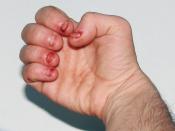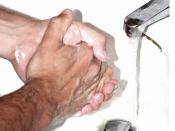Nearly three million people in America suffer from obsessive-compulsive disorder (OCD), and approximately one million of them are children. Data shows that nearly 1 in 200 children suffer from OCD, which can disrupt academic, social and professional progress. OCD is defined as "an anxiety disorder because people with OCD experience anxiety as a result of their obsessional thoughts and when they cannot carry out their compulsive behaviors"(Nolen-Hoeksema, 2004). People who have been diagnosed with OCD have been found to have low levels of seratonin, a chemical that sends signals between the different parts of the brain. Therefore, making OCD a biological issue, like other mental disorders (Kreidie, 2003).
Usually between the ages of 6 and 15 the symptoms of OCD present themselves in males, and in females the symptoms begin between the ages of 20 and 29 (Nolen-Hoeksema, 232). Most people who have OCD try to hide their symptoms from family and friends, and by doing so delaying treatment can be dangerous.
Symptoms vary with the obsession. For example, a person who always feels dirty will take a shower every 30 minutes, to try to keep clean. Approximately 66 percent of people who have OCD also suffer from depression (Nolen-Hoeksema, 232).
Treatment for OCD is a combination of cognitive behavioral therapy (CBT) and setraline, a selective serotonin reuptake inhibitor (SSRI) (Joquest, 2004). In October 2004, Duke University conducted a study of 112 patients between the ages of 7 and 17 who had a primary diagnosis of OCD. Patients were randomly assigned to groups that received either CBT plus setraline, CBT alone, setraline alone, or a placebo for 12 weeks. In the groups receiving medication or the placebo, neither the patients nor the caregivers knew which one the patient was being treated with. However, patients receiving both the CBT treatment...


